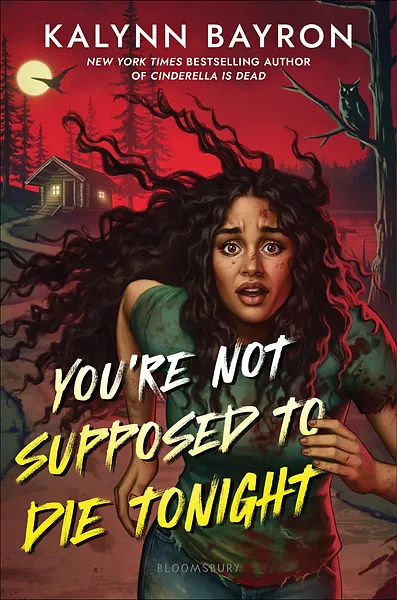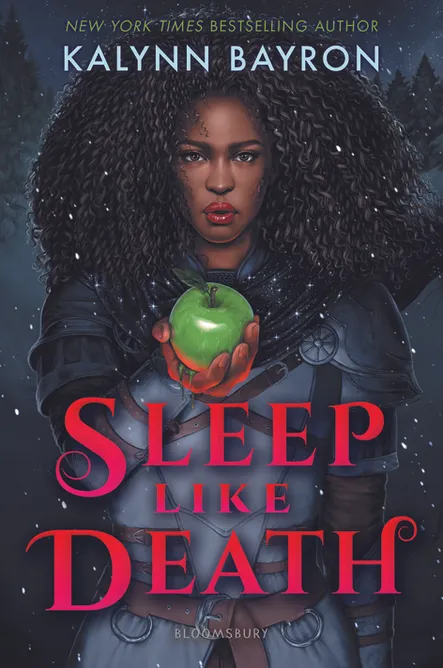¿Que te apetece leer?

In 2020, you published Cinderella Is Dead with great success. Since then, you haven't stopped writing: a duology, several stand-alones, collaborations in various anthologies and you've even ventured into middle-grade. How do you think your writing style has evolved over this time?.jpg)
My process has changed quite a bit since I wrote Cinderella Is Dead. With the amount of work I've taken on I have had to adjust the way I do things. I tend to draft very quickly now and lean more heavily on revisions for the majority of the work. I've learned to trust myself more. I know that the first draft doesn't need to be perfect, it just needs to be done. Outside of the technical aspects of writing, I still very much enjoy my work. Writing is still a lot of fun for me!
In Cinderella Is Dead, society is built around the story of Cinderella. Far from being an ideal scenario, we find a kingdom ravaged by laws that oppress women and anyone who breaks the rules. Of course, it is a terrifying premise, set up to raise awareness. Do you consider that social criticism plays an important role in the creation of your work?
Absolutely. The world I created in Cinderella Is Dead is fictional but many of the issues faced by that society are taken from the real world. Many of the oppressive laws and rules of this society are taken directly from laws or societal standards that have existed, or still exist, today. That's part of the reason that I wanted to write this story. I wanted to highlight how damaging living under patriarchy can be for people of all genders. It's a very conscious choice and I'm glad that this book continues to spark conversations about dangerous gender norms and oppressive societal expectations.
 In your novels, we see a special interest in the reinterpretation of classics. Cinderella Is Dead is a clear example, although it can also be seen in other stories of yours that have not yet arrived in Spain, such as My Dear Henry, a reinterpretation of Dr. Jekyll & Mr. Hyde, or your next work to be published, Sleep Like Death. What draws you to writing retellings?
In your novels, we see a special interest in the reinterpretation of classics. Cinderella Is Dead is a clear example, although it can also be seen in other stories of yours that have not yet arrived in Spain, such as My Dear Henry, a reinterpretation of Dr. Jekyll & Mr. Hyde, or your next work to be published, Sleep Like Death. What draws you to writing retellings?
I love retellings because they allow us to look at stories that we think we know from a completely different angle. And I think there is also room to improve upon classic stories. Those stories are so often a product of their own time and while those of us who really enjoy classic stories might cling to them, younger readers may not be drawn to them in the same way. If we can reimagine those stories and bring them into the present we can inspire a whole new population of young readers. And I have found that if young readers like a retelling they will often go back to the source material. My goal isn't to replace those classic stories it is simply to have my work be in conversation with them.
Worldbuilding is one of your strengths —from settings that combine the real world with dark fantasy to peculiar magic systems and even Greek mythology. How do you face the worldbuilding process every time you start writing a book?
For me the world is something that happens first. I will usually have an idea for what the world looks like before I get an idea of who the characters are. For Cinderella Is Dead, I first imagined a world where Cinderella was a real person and where her story had a huge influence on the people who lived alongside her. That idea evolved into this world that was heavily influenced by her story for generations. Once I had an idea of what the world looked like and felt like, I thought about what kinds of characters would be best to guide us through an adventure in that world. The characters I choose are often the types of characters who would have a really hard time with those rules set up by the world they inhabit. If they fit in nicely, I don't think the story would be as interesting. The world building is such an important piece of my process I spend a lot of time on it. It's a lot of fun to imagine different worlds and as a creative person I really enjoy building those worlds and exploring them through my characters.
Your books are also characterized by their diversity, for example, with the presence of queer and black characters, same-sex families or sapphic romances. In fact, in 2022, you were the winner of the Randall Kenan Prize for Black LGBTQ Fiction. What do you think about nowadays representation in YA literature? Is there still a long way to go?
We have come a really long way. I'm thrilled that young readers today have such a wide range of options when it comes to the types of stories they get to read. I'm even more thrilled that my stories contribute to that conversation. But we still face a lot of opposition. Creators who Work hard to make sure that our work is inclusive face a ton of backlash. It can be incredibly disheartening to work so hard on something and have people absolutely hate it just because it centers Black characters or LGBTQ characters. However, I'm not beholden to those types of people. I write for the young readers who are looking for that type of representation and absolutely no one will keep me from doing that work. I'm happy to have the support of my readers and publishers. We have a long way to go but we are making steady progress and I'm happy to see it.
Delving deeper into this topic, in Cinderella Is Dead, Sophia has to fight against a society with homophobic and misogynistic behaviors, while in This Poison Heart, Briseis faces other difficulties unrelated to her sexual orientation or her skin color. Do you have a preferred approach or do you think both are necessary?
I think both approaches are absolutely necessary. We need stories that directly address homophobia, misogyny, and racism Because they help us navigate those very tough subjects. Equally important are stories where characters get to exist just as they are. In This Poison Heart I really wanted my main character Briseis to not have to worry about being violently oppressed because of her sexuality or the color of her skin. I wanted her to be able to solve a mystery and go on an adventure. It's really about the balance between the two approaches. For a very long time, when we were telling stories about Black characters, about LGBTQ characters, there was only one narrative and that was centered on pain and trauma. But what that teaches our readers is that this is the only way that these characters get to exist and that is simply not fair or true. There needs to be a balance of stories that allow us to navigate pain and trauma with stories that allow characters to exist just as they are.
 One of your latest works (You're Not Supposed to Die Tonight) is a YA horror novel. Do you consider the writing process to be different from your previous dark fantasy novels? Are there any other genres you would like to tackle next?
One of your latest works (You're Not Supposed to Die Tonight) is a YA horror novel. Do you consider the writing process to be different from your previous dark fantasy novels? Are there any other genres you would like to tackle next?
The process is very similar but with horror I think I like the fact that I can go quite a bit darker than I do with my fantasy work. The fantasy I write is dark, but the horror genre opens up an entirely new world of possibilities. I really enjoy writing in that space. As far as other genres that I'd like to get into, I'd really like to write a romance. I read a lot of romance I find it fun and really enjoyable so I'd like to give it a try at some point!
 You have announced on social media that your next book, Sleep Like Death, will be published this June. What can you tell us about it?
You have announced on social media that your next book, Sleep Like Death, will be published this June. What can you tell us about it?
Sleep Like Death is a YA fantasy and it is a Snow White reimagining. It tells the story of my main character Eve, who is a Princess but is also a capable and fearsome warrior. The queendom she lives in is being threatened by a sinister force Known simply as the Knight—a mysterious wish granting figure with a shadowy past. Eve is forced to align herself with an enemy in order to rid the land of the Knight but in the process comes to understand that not everything is as it seems and that you should be careful what you wish for…because you just might get it.
We can't wait to read it! Thank you so much for answering our questions!











